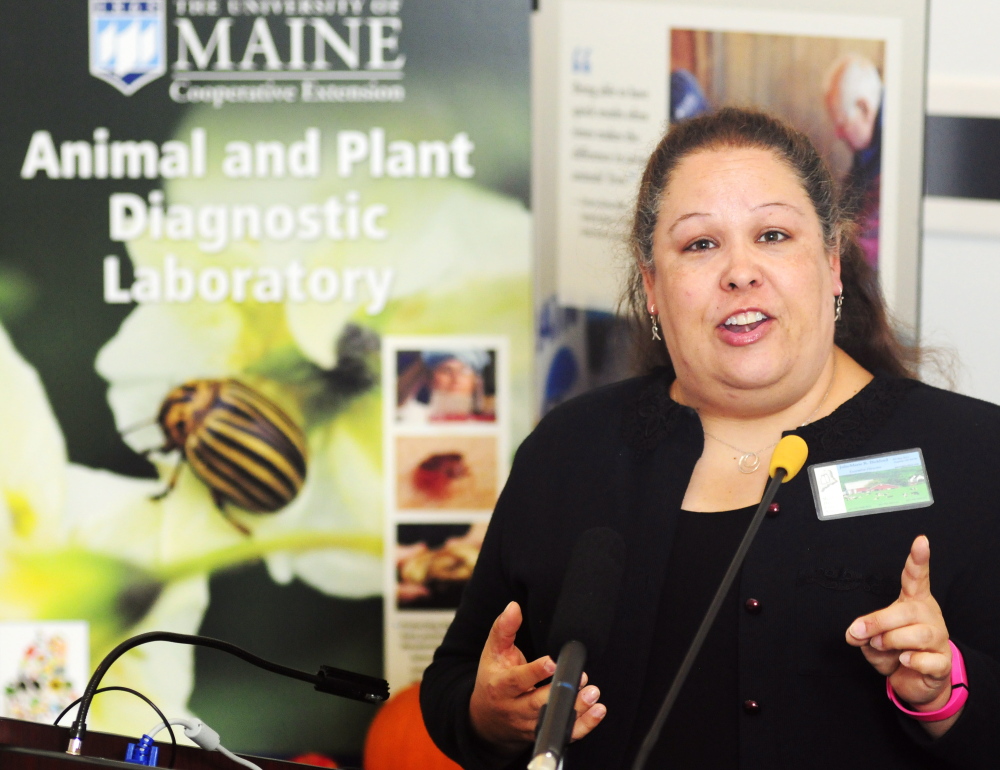AUGUSTA — On a Friday afternoon earlier this year, a young father came into the University of Maine’s Cooperative Extension with what turned out to be an engorged deer tick he’d removed from behind his 7-day-old son’s ear.
Once the tick was identified, the frantic man asked workers there what they could tell him about the tick, such as whether it carried any diseases, such as Lyme disease, that it could have passed on to his young son.
“We said, ‘We can’t tell you anything else'” other than it was a deer tick, said James Dill, a pest management specialist for UMaine Cooperative Extension, who said the extension’s outdated laboratory can’t test for communicable diseases because it is not biosecure. “So he had to either send that tick off, out of state, to get it tested, or wait for symptoms to occur in his son. He was frantic. In my experience, it’s a minimum of three weeks to send it out of state for testing.”
Dill, a Democratic state representative from Old Town, said Maine needs its own biosecure laboratory so it can test for diseases such as Lyme.
He was one of several people to speak Tuesday at a news conference in favor of Question 2, which goes to voters as part of a slate of proposed state bond questions in November.
The referendum question asks voters: “Do you favor an $8 million bond to support Maine agriculture, facilitate economic growth in natural resource based industries, and monitor human health threats related to ticks, mosquitoes, and bedbugs through the creation of an Animal and Plant Disease and Insect Control laboratory administered by the University of Maine Cooperative Extension?”
Farmers, veterinarians, sportsmen and others advocated for passage of the bond to create the new animal, plant and insect laboratory. They said the laboratory would help the cooperative extension work more closely with Maine farmers and other food producers to ensure strong, productive, safe and healthy food and livestock by monitoring pests and plant diseases and with the state Inland Fisheries and Wildlife to monitor game species’ health.
Julie-Marie Bickford, executive director of the Maine Dairy Industry Association, said the extension’s current laboratory doesn’t even have a door big enough to get any animal bigger than a small calf inside. She said the proposed new laboratory would help dairy farmers she represents make sure the products their herds provide are safe by providing testing and other helpful information.
She said such a laboratory could provide critical information which could help every farm family fulfill its mission, “and that is to provide safe, healthy food. This is a diagnostic lab that is going to help all of us.”
Matthew Gagnon, executive director of the conservative advocacy group Maine Heritage Policy Center, said the organization opposes the bond proposal because it does not believe in borrowing for such projects.
“We believe increasing debt for this kind of project is the wrong way to go,” Gagnon said, citing several other state funding challenges, including a budget hole in the state Department of Health and Human Services. “Adding more debt on top of that is hamstringing future budgets. The real problem is we’ve chosen this as a way of funding our spending priorities.”
He said bonds could be acceptable for some major state infrastructure projects, “but not a place to study bugs at UMaine.”
Presenters at the news conference said the state can’t afford to not create such a laboratory, especially as Lyme and other diseases become more of a public health threat here.
Jon Olson, executive secretary of the Maine Farm Bureau Association, noted Maine has more than 8,100 farms and 1.3 million acres of working farmland, making Maine a top food producer in New England and agriculture an important part of the economy.
David Trahan, executive director of the Sportsman’s Alliance of Maine, noted the laboratory could be an important tool to protect wildlife, including game animals such as deer, and that hunting and fishing are a huge part of the state’s economy.
Trahan said ticks have killed or weakened thousands of Maine moose.
Also, he noted, nearly every family in Maine can name a friend or relative who has suffered from Lyme disease or other tick-borne illnesses.
Dr. Bill Bryant, past president of the Maine Veterinary Medical Association and a veterinarian in Winthrop, said the bond would pay for a laboratory that is critical for developing strategies to deal with diseases such as Lyme and to track the spread of ticks such as the Lone Star tick, a tick increasingly found in Maine but more commonly found in Southern states where it has spread disease.
“It isn’t just Lyme disease. There are several other tick-borne diseases out there,” Bryant said. “This issue is about Mainers protecting Mainers’ livelihoods, prosperity and health, and, of course, their pets.”
Keith Edwards — 621-5647
kedwards@centralmaine.com
Twitter: @kedwardskj
Send questions/comments to the editors.




Comments are no longer available on this story